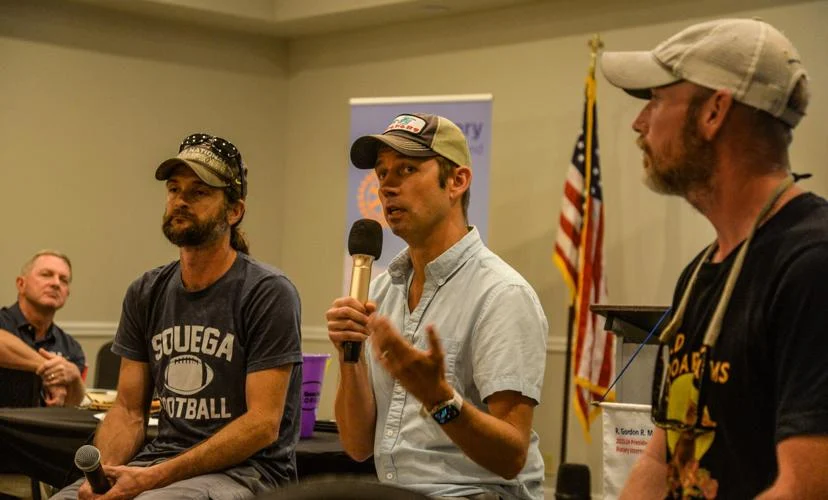By TAYLOR COOPER – The Brunswick News –
Rotary Club of St. Simons Island member Janice Lamattina, moderating a panel of local farmers at the club’s recent luncheon, asked Brandon Chomko about Grassroots Farm, where he raises, processes and sells hogs and chickens.
“Part of that article was that you could process 30 chickens an hour,” Lamattina said, referencing an interview he did for Southern Soil magazine. “How do you process 30 chickens an hour? It’s lunch, though, so don’t get too gross.”
“If I got too far into it, you’ll run out of time,” Chomko jokingly replied. But he did try to explain how he got through it day-to-day.
Chomko got into farming in a roundabout way. He was late to college, earning a history degree from Valdosta University in his late 20s.
“It’s a degree, but it really had nothing to do with anything,” he said.
After moving to the Atlanta area, Chomko started raising chickens for food for his family. That grew into selling chickens to restaurants. To continue growing, he needed more space and a milder climate — hence the move to Woodbine, where Grassroots Farm is now. He did retain a love of writing, though, and later puts his thoughts down on paper after working on the farm.
Chomko said he treats his chickens well because a happy and healthy chicken just tastes better. A chicken’s life is not an altogether unenviable one, he said.
“If you told me I would have one bad or questionable moment in an otherwise wonderful life, sign me up,” Chomko said.
When people go to the store, they often look for organic eggs or those from free-range chickens, Lamattina said. It’s easy to get wrapped up in all marketing terms, like free-range, grain-fed, organic, heritage, etc. She asked how customers can learn what these mean.
“A lot of these are feel-good monikers” that have been watered down and co-opted by corporations since the initial organic craze of the 1970s, said Sam McPherson, farm manager at Potlikker Farm. Corporations largely steer the ship when it comes to agriculture, he said, leading to a major disconnect between people and their food.
Or better yet, grow your own food, he continued.
McPherson said agriculture in the South is a growth industry.
“There’s only room for growth in the market if you figure out what works in our area,” McPherson said.
South Georgia was an agricultural powerhouse in the 19th and 20th centuries, at the time out of necessity. But it could be again, he said. New growers are still learning what was likely once generational knowledge among Georgia farmers. Anyone who gets into farming is likely going to experience many failures along the way.
“But learning is a constant process of failure,” McPherson said.
For example, when he and McPherson established Potlikker Farm, one of the first crops to be planted was horseradish. Gowen said that’s because Georgia Sea Grill had a horseradish-encrusted fish on the menu, and he wanted to try growing their own and selling a pre-packaged mixture.
“We never saw Southeast Georgia horseradish, and there’s a reason,” Gowen laughed.
But along with the horseradish, McPherson said he wanted to try growing turmeric. That was a great success, and now Potlikker has two fields for turmeric.
The entire economy of the coastal region could be changed in 20 years by organizations training farmers today, McPherson said. The University of Georgia’s agriculture extension office, Golden Isles College and Career Academy and College of Coastal Georgia offer training for farmers and entrepreneurs, and he looks forward to seeing how the growing scene changes.
“There’s not enough from local farms to go around — yet,” Gowen said.

